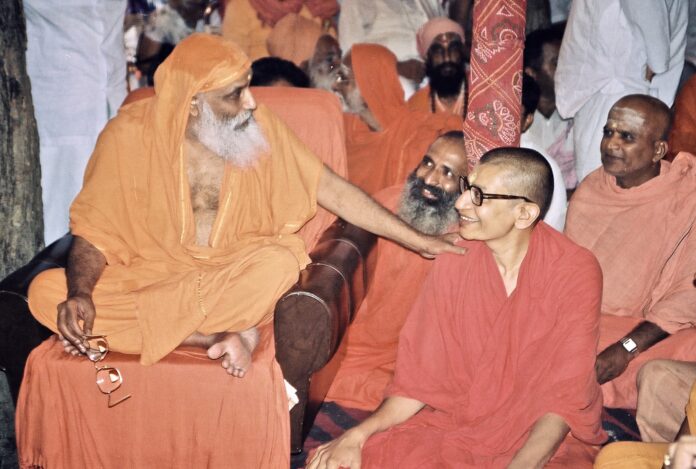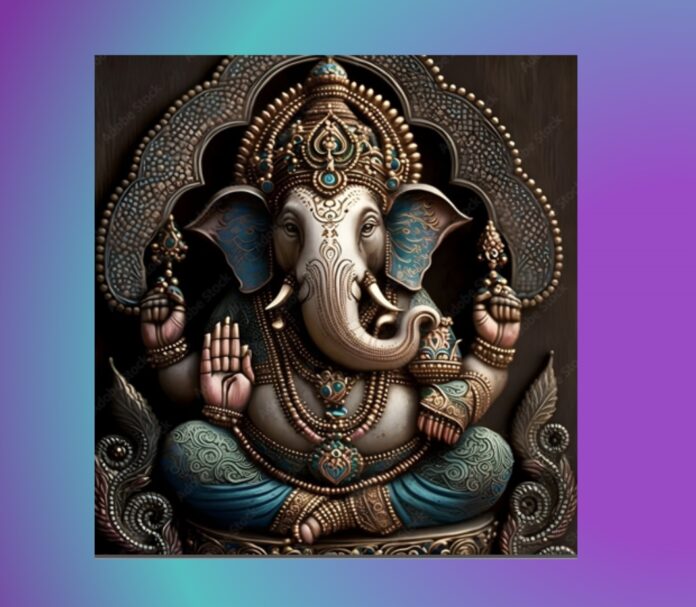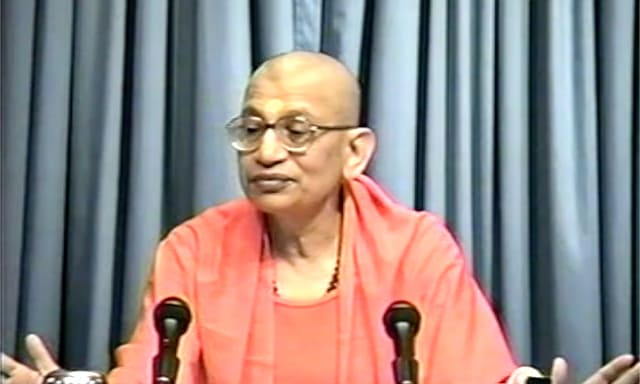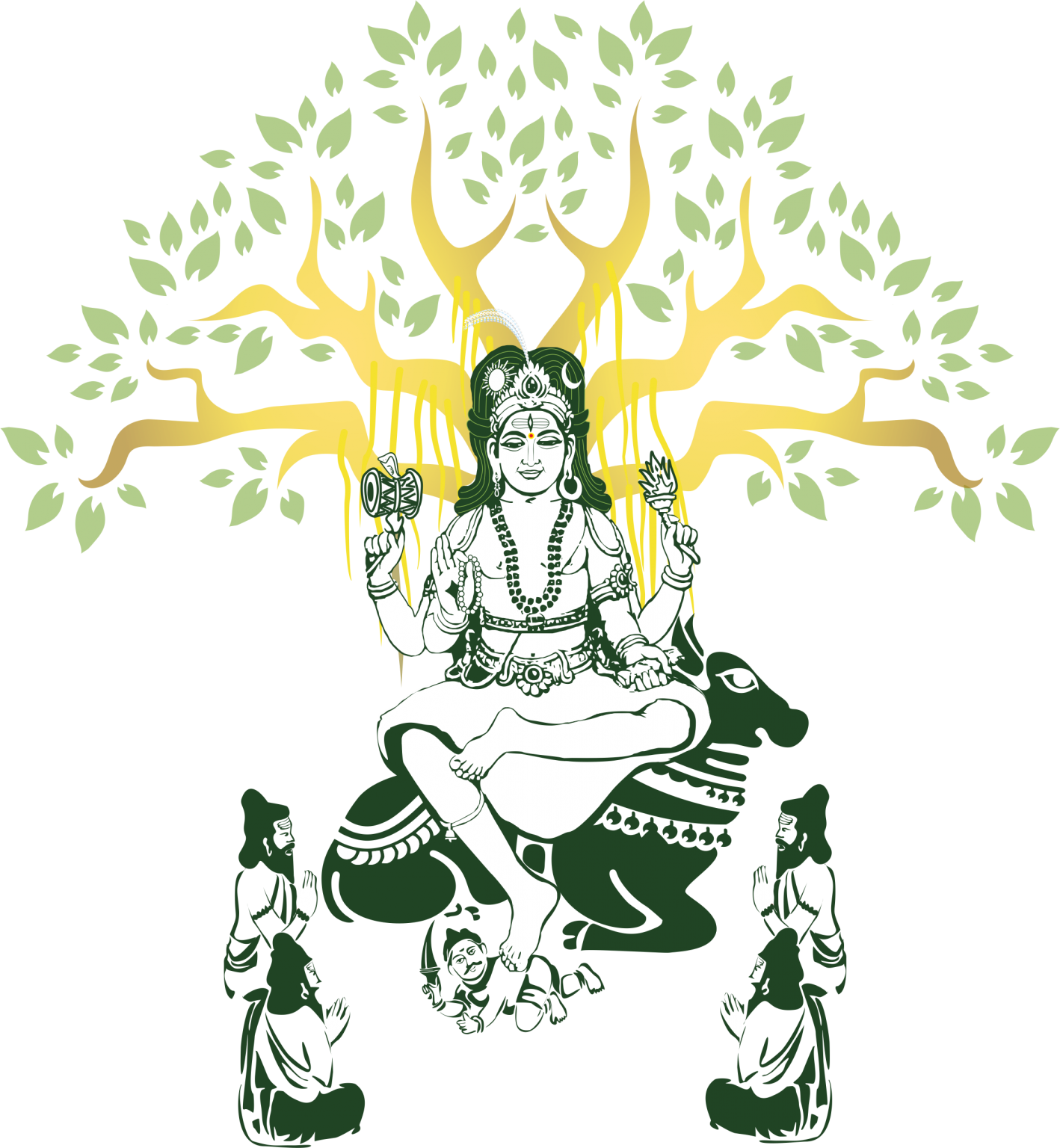Seven Verses in Praise of Durgā
Swami Viditatmananda Saraswati[Published in the Arsha Vidya Gurukulam 36th Anniversary Souvenir, 2023]
Saptaślokī Durgā is a hymn of seven verses selected from the sacred text known as Durgā-saptaśatī or Devī- māhātmyam or Caṇḍī. This text describes the triumphs of Durgā, the divine mother of the universe. The text consists of 700 verses divided into 13 chapters. The chapters are further divided into three caritras, or the accounts of the adventures of Durgā. The first chapter comprises the first caritra and describes the tāmasika incarnation of the Goddess as Mahāmāyā or Mahākālī. In this incarnation, the demons Madhu and Kaiṭabha were slain. The second caritra is described in the next three chapters (2–4). This relates the rājasika incarnation of Durgā as Mahālakṣmī, who destroyed the demon Mahiṣāsura. The third caritra describes the sāttvika incarnation as Mahāsarasvatī, who slays the demons Dhūmralocana, Caṇḍa, Muṇḍa, Raktabīja, Niśumbha, and Śumbha. Chapter 11 is mainly in praise of Devī by the devatās. It is from this chapter that most of the verses of Saptaślokī Durgā are chosen. The first verse of the hymn is from the first chapter, the second verse from the fourth chapter, and the remaining verses are from the eleventh chapter.The first verse describes the nature of Mahāmāyā. The context is that a powerful king named Suratha has to leave his kingdom when he is not only defeated in battle by his enemies, but also robbed of his treasury and his army by his own vicious and evil-disposed ministers. On the pretext of hunting, the king comes to a forest where he sees the hermitage of the sage Medhas. There he meets a merchant named Samādhi, who was also driven away from his home by his wicked and greedy sons and wife. Despite being treated in such a cruel manner by their near and dear ones, each one was nevertheless unable to forget their family and possessions, and was preoccupied with thoughts of attachment to them. Both of them approach the sage Medhas with the question: “How is it that we are attached to and unable to forget the very people who were cruel to us?” In reply, the sage says (verse 1-55):
ॐ ज्ञानििञामनि चते ञानं ि दवे ी भगवती नि िञा ।
बलञादञाकृ ष्य मोिञाय मिञामञायञा प्रयच्छनत ॥१॥
om jñānināmapi cetāṁsi devī bhagavatī hi sā balādākṛṣya mohāya mahāmāyā prayacchati
Om! Bhagavatī, who is Mahāmāyā, forcibly drawing the minds of even the learned, verily throws them into delusion. (1)
The sage seems to say that the Goddess of indestructible power causes the minds of not only the worldly people like you, but even people possessed of knowledge, to turn away from viveka or discrimination and makes them inclined to attachment and possessiveness. The Purāṇas are full of stories of men of power and even great sages falling prey to the enchantment of lust and greed. What to speak of you, the ordinary worldly people, who find themselves attached even to those entities that finally cause us only sorrow?
This statement is followed by the story of the demons Madhu and Kaiṭabha, who sprang from the dirt of the ears of Lord Viṣṇu while he was in slumber during dissolution of the world. They sought to slay Lord Brahmā, the Lord of creation, who was sitting in the lotus that emerged from the navel of Lord Viṣṇu. Brahmā prayed to Mahāmāyā to quickly awaken Lord Viṣṇu from sleep and make him slay these two demons. Lord Viṣṇu was awakened and then engaged in a long battle with the two demons. Frenzied with their exceeding power and deluded by Mahāmāyā, the two demons exclaimed to Lord Viṣṇu, “Ask a boon from
Thus bewitched by Mahāmāyā, the demons granted the boon to Lord Viṣṇu, who slew them. This is the power of Mahāmāyā, who deludes even the most powerful. This episode also reveals how even the position of Brahmā, the creator, is not free from fear and misery. That is the power of Mahāmāyā or Mahākālī, the tāmasika manifestation of Devī.
The second verse of Saptaślokī Durgā is taken from the second caritra and describes the rājasika incarnation of the Devī as Mahālakṣmī. This caritra shows how even the devatās are not above misery.
The demon Mahiṣāsura routed the devatās in the battle, occupied the throne of Indra, drove away all the devatās from their respective positions, and began wielding their power and privilege himself. Then Mahālakṣmī was born from the collective luster of all the devatās, who also presented her with their respective weapons. Mahālakṣmī challenged Mahiṣāsura to a battle and destroyed the wicked demon along with his army. The devatās then praised the mother Goddess. That hymn forms the fourth chapter of the text.
The second verse of Saptaślokī Durgā is taken from this chapter (verse 4-17):
दुगगे स्तृ ञा िरनि भीनतमशषे जन्ोोः स्वस्ोः्थै स्तृ ञा मनतमतीव शभु ञां ददञानि । दञानरद्र्यदुोःखभयिञानरनि कञा त्वदन्ञा िववोिकञारकरिञाय िदञार्दनद्र चत्ञा ॥२॥
durge smṛtā harasi bhītimaśeṣajantoḥ svasthaiḥ smṛtā matimatīva śubhāṁ dadāsi dāridryaduḥkhabhayahāriṇi kā tvadanyā sarvopakārakaraṇāya sadārdracittā
When people who are caught in calamities remember you, O Durgā, you rescue them all and remove their fear. O Durgā, when remembered by people of pure mind, you grant them auspicious knowledge (leading to mokṣa). O remover of poverty, misery, and fear, who is there other than you, whose heart melts to help everyone? (2)
The word durga means adversity, calamity, and distress. In this verse, it takes the form durge, which is a grammar-based pun in Sanskrit. If understood in the locative case, durge is translated as ‘during calamities.’ Durge smṛtā would therefore mean “when she is remembered during calamities.” Alternatively, durge can be understood as the vocative case of Durgā, meaning that one is addressing the Goddess directly.
Then the meaning of durge smṛtā would be “O Durgā, you are remembered.” Both meanings are legitimate and the phrase can even encompass both meanings simultaneously, i.e., “O Goddess, when you are remembered by those who are caught in calamities.” The Goddess is called Durgā because she removes the adversities or calamities of her devotees.
O Durgā, when you are remembered or called upon by the afflicted, you rescue them from fear, adversities, or calamities. When you are remembered or called upon by those possessing a pure mind, meaning those who are free from selfish motives, you provide them with extremely auspicious knowledge or understanding, which is the means to attain any puruṣārtha, human end, particularly mokṣa. In the context of bhakti, the sentence can also mean that you give them devotion, affinity, or commitment to reciting your mantra, meditating upon you, or worshipping you.
O Devī, you are the one who removes the poverty, mis- ery, and fear of those who take refuge in you. Poverty brings misery, which creates fear. It is your nature to remove these from anyone who seeks your help. Since there is tremendous compassion in you, your heart melts at the thought of the pain of others and you are ready to render help to them whether they are your devotees, your enemies, or those who are indifferent to you. This verse is chanted as a mantra to become free from poverty and misery.
The remaining five verses of this hymn are selected from the 11th chapter of the text. Most of this chapter is in the form of praise of the Goddess in her sāttvika incarnation as Mahāsarasvatī after she slew the terrible demons Niśumbha and Śumbha, along with their pow- erful army. That hymn is also called Nārāyaṇī-stuti.
The next verse is the tenth verse of chapter 11:
िवमद्र ङ्गलमञाङ्गल्ेनशवेिवञार्द्र िद्र ञानिके । शरण्येत्र्यम्बके गौनरिञारञायनििमोऽस्ुते ॥३॥
sarvamaṅgalamāṅgalye śive sarvārthasādhike śaraṇye tryambake gauri nārāyaṇi namo’stu te
Salutations to you, O Nārāyaṇī (consort of Lord Nārāyaṇa), who is the auspiciousness of the auspicious, who brings good fortune, who accomplishes the four human ends (dharma, artha, kāma, and mokṣa), the ref- uge of all, the three-eyed, the consort of Lord Siva. (3)
Devī is the auspiciousness of the auspicious. From the Vedāntic point of view, happiness is auspicious in the true sense. Hence, the means of happiness (self-knowl- edge) and the means of knowledge (śruti) are all auspi- cious. Devī is the source and the content of śruti. She is also of the nature of happiness and therefore truly the one that imparts auspiciousness, even to śruti. Simi- larly, the sounds om and atha are also considered aus- picious because Brahmā, the creator, commenced the act of creation with utterance of the sound atha. Such things as svastika, pūrṇa-kumbha, etc., which are sym- bols of auspiciousness, also derive that quality from the divine Mother. Therefore, she is Śivā, one who brings good fortune. You are always bounteous to those with whom you are well pleased. Those fortunate ones are indeed objects of esteem in the country – theirs are riches, theirs are glories, and their acts of righteousness perish not. They are indeed blessed and possessed of devoted children, servants, and spouses.
Śivā also means the consort of the Lord Śiva. The word can be further explained to mean Nārāyaṇī, the con- sort of Lord Nārāyaṇa and also Sarasvatī, consort of Lord Brahmā. She therefore possesses the powers to create, preserve, and destroy. She is omnipotent and therefore Śaraṇyā, fit to be the refuge where devotees become free from sorrow and fear. She grants boons to her devotees, who can fulfill any desires they have: worldly desires like dharma (heaven), artha (material prosperity), or kāma (pleasures). To the discriminative, she grants mokṣa (liberation) because she is the karma- adhyakṣā (presiding over karma) and the karma-phala- dātrī, dispenser of the results of actions.
She is Tryambakā, the one possessed of three ambakas. Ambaka means eye. She is possessed of three eyes in the form of sun, moon, and fire because she is the cos- mic person. Ambaka also means a father, one who is a protector. Brahmā, Viṣṇu, and Maheśa, who are protec- tors, are the retinue or attendants of Devī and therefore she is called Tryambakā (Tryambake is the vocative case). She is Gaurī, which means one of fair complex- ion. The word also means Parvatī, the consort of Lord Śiva. She is Nārāyaṇī, the consort of Lord Nārāyaṇa or Viṣṇu, and therefore māyā. This verse can be recited for gaining prosperity and auspiciousness.
The next verse says:
शरिञागतदीिञातिद्र नरत्ञाििरञायिे ।
िवस्द्र ञार्तिरेदनेविञारञायनििमोऽस्ुते ॥४॥
śaraṇāgatadīnārtaparitrāṇaparāyaṇe sarvasyārtihare devi nārāyaṇi namo’stu te
O Nārāyaṇī, you are intent on saving the dejected and the distressed who take refuge in you, and you remove the suffering of all. Salutations to you. (4)
Goddess Durgā is parāyaṇā, solely committed to help- ing and saving those who take refuge in her. That is why she came to the rescue of the devatās whenever they took refuge in her, appearing in a suitable form to protect them from the danger caused by the demons. The devatās were dīna, dejected, because they were robbed of their power and luster by the demons and were helpless. They were ārta, distressed, because they were harassed by the demons. The Goddess came to their rescue, killed the demons, and reinstated the devatās to their own abode and their original luster.
What is true for the devatās is of course true for all living beings because Durgā is the universal mother who nurtures and nourishes all her children. In daily life, we human beings are dejected because of the three-fold afflictions. The first one is ādhyātmika, arising from physical suffering such as diseases, etc., and mental suffering such as sorrow, etc. The second is ādhibhautika, arising from the surroundings (the el- emental world), such as insects, wild animals, thieves, etc. The third source of suffering is ādhidaivika, caused by devatās manifesting as the natural forces such as heat, cold, flood, earthquakes, etc. Human beings seek succor from these afflictions, and the mother provides that succor in response to their prayers. Repetition of this verse is prescribed for removing distress and de- jection.
ि व स्वद्र रू ि े ि व शगे े ि व शद्र न ति ि म न वि त े ।
भयभ्ये स्तञानििोदनेवदुगगेदनेविमोऽस्ुते॥५॥
sarvasvarūpe sarveśe sarvaśaktisamanvite bhayebhyastrāhi no devi durge devi namo’stu te
O Devī, you are in the form of all (or: all is in the form of you). You are the ruler of all, possessed of all pow- ers. Please protect us from all the fears (or dangers). O Devī Durgā, salutations to you (verse 11-24) (5)
Durgā, the mother Goddess, exists in the form of the whole universe made up of animate and inanimate beings because she is the upādana-kāraṇa, material cause, of the universe. She is the self or essential na- ture of all the beings. She is the omnipotent creator and she rules the entire universe. That is why we find an order in the universe. Even the devatās, the mighty forces such as wind, fire, etc. all function according to the rule set by the divine mother as though they are obedient servants. Kaṭhopaniṣad describes the ruler as a master with an uplifted thunderbolt – mahadbhayaṁ vajramudhyatam.
The whole universe is ruled by the mother Goddess. It is under her control, and therefore we can appeal to her for making even the cosmic forces favorable to us. All of the powers possessed by the devatās, cosmic forces, are the powers of Devī. She alone acts through them or manifests as devatās. O Devī, please protect us from the dangers of the demons, the inimical influences in our life. Repetition of this śloka is prescribed when seeking freedom from fear.
रोगञािशषे ञािििंनि तष्ु ञा रुष्ञातुकञामञािि् कलञािभीष्ञाि्। त्वञामञानरितञािञां ि नविन्नरञािञां त्वञामञानरितञाह्ञारियतञांप्रयञानन् ॥६॥
rogānaśeṣānapahaṁsi tuṣṭā ruṣṭā tu kāmān sakalānabhīṣṭān tvāmāśritānāṁ na vipannarāṇāṁ tvāmāśritā hyāśrayatāṁ prayānti
You remove all illness when you are pleased, but de- stroy all longed-for desires (desirable objects) when you are wrathful. No calamity befalls those who take refuge in you. (Not only that but), those who have taken refuge in you verily themselves become a refuge for others. (6)
When the Devī is pleased by the worship of her devo- tees, she removes all their illness, which may be at the level of the body or the mind. She removes ādhi, men- tal pain or anguish, vyādhi, physical ailments or dis- eases, and upādhi, suffering or calamity caused by oth- ers. This was demonstrated in the case of the devatās, whose impediments were all removed by the divine mother when she was pleased with their devotion and prayers. When she became angry with the demons, on the other hand, she destroyed them all, including all their possessions.
Should we conclude from this that Devī is partial to devatās and cruel to the demons? That cannot be, since she is the embodiment of compassion. Therefore, the punishment rendered to the demons is also for their ul- timate welfare. Like any loving mother, she as though becomes cruel to the children only to be kind to them. When a mother administers bitter medicine, any child resists, but it is for the child’s own good. She is the ruler of the world and to maintain harmony, it is necessary for her to protect the good and destroy the wicked. That is the way to establish dharma, the moral and social order. The outward-looking anger is accompanied by grace in her mind.
When the devotees take refuge in her and place com- plete trust in her, there can be no calamities for them. In fact, a time comes when they themselves become a refuge for others. Repetition of this verse is prescribed for gaining freedom from illness.
The last verse of this hymn says:
िवञाबद्र ञािञाप्रशमिंत्ल्थै ोक्यस्ञानखलेश्वनर । एवमवे त्वयञा कञायमद्र स्द्न्थै रनविञाशिम ् ॥७॥
sarvābādhāpraśamanaṁ trailokyasyākhileśvari evameva tvayā kāryamasmadvairivināśanam
O supreme ruler of the entire universe, please re- move the miseries of all the three worlds. Also, as you have just done (by slaying the demons Niśumbha and Śumbha), may you please destroy our enemies in the future also. (7)
The word sarvābādhāḥ is explained as sarvāḥ ābādhāḥ, meaning all the miseries in every way. The devatās are asking Devī to remove the miseries of all whenever the occasion arises in future, as she has just done in the case of the demons Niśumbha and Śumbha.
The devatās want the assurance of protection at all times in the future also. Devī also describes to them her future manifestations when she will destroy Niśumbha and Śumbha (in their new avatāras) in the 28th yuga during the reign of Vaivasvata Manu, and will also kill the demon Vaipracittas. She will be born as Sākambharī and will cause a rain of life-giving herbs and vegetables when there will be a long famine. She will be born as Durgā and will destroy the demon Durgama. She will be born as Bhimādevī and swallow the demons who are harassing the sage in the Himālaya mountains. She will take the form of Bhrāmarī and kill the demon named Aruṇa. Thus, whenever calamity befalls the world, Devī says, “I shall take the necessary embodiment and destroy the enemies of the world.” Recital of this verse is prescribed for removing miseries.
Saptaślokī Durgā concludes with this verse. Most of the verses of this hymn are prescribed for freedom from miseries or the attainment of happiness. The mere recit- al of these verses will therefore grant peace and seren- ity. When recited with understanding and contempla- tion upon the meaning, they will certainly bring grace and the blessing of the divine mother, leading to the knowledge of her true nature.
The last three verses of this hymn were selected as a prayer to mother Goddess for protection from fear, freedom from illness, and removal of miseries for man- kind during the pandemic. Hundreds of devotees in many countries chanted these prayer verses during the months of the pandemic. Each verse was to be chanted 21 times. Many have continued to chant these prayers, and anyone else can do it for the grace of mother God- dess and protection from fear, disease, and calamities.



